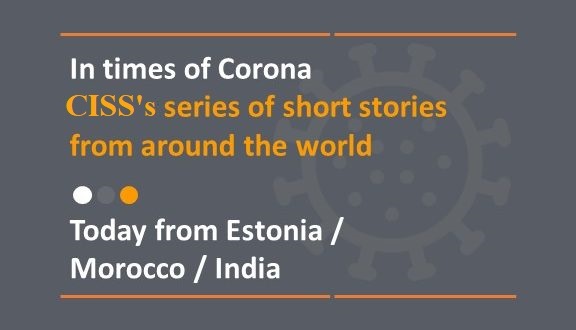
CISS’s Series in Times of Corona: Today from Estonia / Morocco / India
Estonia: COVID-19 and Human Rights
Estonia acted swiftly to manage the outbreak. In light of the emergency situation declared in March , I continue to spend my days inside, as are many others. Whilst tedious, the restriction of movement provides me with a sense of safety. However, turning to the human rights situation across the world as this pandemic unfolds, it is clear that this is not the case for everyone.
Amongst several rights issues, Amnesty International points to housing, water and sanitation. Not having a roof over your head, or solely access to informal settlements complicates the guidelines individuals are to follow. Governments have to provide necessary means in order to ensure the protection of human rights, not least for marginalised members of society.
Moreover, UN Secretary General António Gutteres addresses the immense increase in domestic violence and calls for government action as part of states’ responses to the pandemic.
In the midst of COVID-19, severe human rights violations take place. If anything, we must care for, and stand up for each other.
About the author: Patrik Persson currently studies the master’s programme in International Relations and Regional Studies at the University of Tartu, Estonia. His specialisation is the European Union.
Morocco’s Response to Covid-19
Morocco’s response to Covid-19 began in early February, soon after it repatriated students from China. In fact, when the epidemic started to take its toll in Asia and Europe, officials displayed a calm and comforting attitude in their public appearances, assuring that the north African nation will not experience a similar tragedy. The officials repeatedly turned to the reassurance rhetoric to quieten the citizens, albeit the report of the first case on March 2.
Yet, the public panic sparked regardless, and many citizens showed concern and scepticism towards the government’s capability to cope with the crisis due to its deficient public health system and regional disparities. The non-urban areas are disadvantaged when it comes to access to public facilities. Given this situation, Morocco had plausible reasons to take draconian and swift measures despite the serious economic consequence that they represent.
As the number of cases began to increase, Morocco cancelled all sorts of gatherings, closed maritime and air borders, mosques, schools, and restaurants, except supermarkets and grocery shops. On March 20 the authorities implemented a health state of emergency and a one-month curfew. This decision evoked the enforcement of restrictive measures and prosecution against the violators. At the time, the country created a $1 billion fund to upgrade the health infrastructure and support the potentially affected sectors.
Morocco has not historically prioritised the public health sector. Yet, it is seemingly now aware of how indispensable it is. The public opinion calls for reform after the crisis.
About the author: Youssef Igrouane is a researcher at Coop4Med, a think tank based in Madrid. He holds of a master’s degree in European Interdisciplinary Studies from the College of Europe in Poland-Belgium.
Corona Virus in India: Dividing A Nation Already Divided
With over 5000 confirmed cases, India’s Prime Minister Narendra Modi, on a notice of 4 hours, called for a 21 day lockdown starting on the 25th of March. While the country’s privileged upper class spends lockdown pursuing hobbies and bingeing TV, the plight of the lower class majority stands in stark contrast.
The informal sector that represents 90% of India’s total workforce has no means of income, forcing workers to return back to their native villages hundreds of kilometres away. During this journey, these migrants had to randomly undergo disinfection, while Indians returning from abroad were only asked to self-quarantine, thus highlighting the inequality in treatment of classes.
Social distancing is a luxury in densely populated India, especially in Dharavi, Asia’s largest slum, which already reported 13 cases. This raises fears as slum dwellers lack the option of space and being in lockdown seems like a death trap.
Another aspect is the religious politicization of the virus, as it has worsened the perpetual Hindu-Muslim divide. After a two day convention in Delhi of Tableeghi Jamaat, which led to clusters of the virus spreading throughout India, sentiments against Muslims on social media increased.
The solution by Modi’s government has included lighting candles, banging vessels for appreciation, and appealing to businesses to continue paying their employees. However, his speeches are seen as a distraction tactic rather than a tangible solution to an ever-dividing and suffering India.
About the author: Rafia Alam is a masters student at University of Tartu (Tartu, Estonia). She is studying International Relations and Regional Studies, and is from Kolkata, India.
